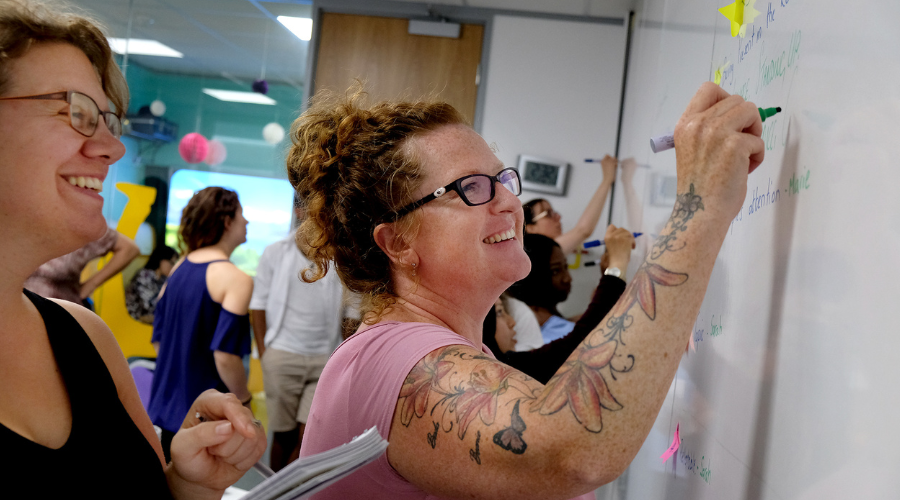How The Public Sector Gives its People Trust

I have asked thousands of people when they work at their best. For over 90% of them it has been when they have been given the trust and freedom to make their own decisions.
I have also asked whether they like “complete freedom” or “freedom within guidelines”. While there are a few anarchists who like complete freedom (especially entrepreneurs) most people – again roughly 90% – choose freedom within guidelines.
People like to know what the overall framework is, but to have freedom within it.
I also ask whether people like to be told what to do. Fewer than 2% go for that option.
How to Be a Multiplier and Why it is Important

I recently did a podcast with Liz Wiseman, the author of Multipliers: How the Best Leaders Make Everyone Smarter (and Impact Players).
Her book, Multipliers, has had a transformational impact on Happy and on our programmes. All of our ‘people managers’ are Multipliers, who enable their people to do their best work, and we’ve began training others on how to be a Multiplier on our leadership programmes.
How Happy’s Level 7 Senior Leaders Programme Has Ignited Change in Organisations

Our aim with our
Level 7 programme for Senior Leaders
was to not just teach a few leadership tips, but to ignite real change in their organisations. As an apprenticeship qualification, the focus is on implementing ideas and on-the-job learning rather than sitting in long, dull lectures.
Our first Level 7 cohort has recently finished the programme. In this blog, Henry speaks to people who attended the programme and how it changed both their leadership style and their organisation.
Happy People – Executive Coaching Testimonial
Are you new to leadership role? Have you have been an executive, leader or manager for a long time?
The Importance of 2 Tracks For Promotion

A colleague at a client told me, when they started with the organisation, that their manager said to them:
“I’m not really a people person.”
“I probably won’t remember your name.”
“I would much rather be writing reports at my desk.”
What should that person be doing? They should not be managing people, and if they are good at writing reports, they should be well paid for it.
What Are the Benefits of Employees Being in Control?

Last month I wrote a
LinkedIn post
suggesting that staff should decide the CEO’s salary, based on my own experience of doing just that.
So far it has received 344,000 views and 505 comments. And it seems to have been controversial.
How Happy Makes Space for Women in Leadership

You may have seen rather gleeful headlines recently reporting that Marie Kondo has relaxed her stance on tidying up after the arrival of her third child. These days she’s focusing less on the mess and more on the joy. We love this quote from her: “My home is messy, but the way I am spending my time is the right way for me at this time at this stage of my life.”
At Happy we were inspired by her idea of things sparking joy, so much so that our strapline is ‘Creating Joy at Work’. It’s something we practise, and we measure regularly, aiming for all of our staff to spend a high proportion of their time at work doing things that bring them joy.
How Easy Is It to Get Things Done in Your Organisation?

Is your organisation one where people can move quickly and get new ideas out there, or is it stymied in levels of approval and hierarchy?
In this blog, Henry discusses some of the various approaches of several well-known companies, as well as Happy’s own policy towards this.
Why We Should Stop Asking For Degrees in Recruitment

Let’s stop asking for degrees in recruitment.
Santander recently announced that they would remove the requirement for a 2:1 degree from its graduate scheme, and is apparently the only bank to allow graduates with a third-class degree.
I would go beyond that and ask why degrees are necessary at all.
Maybe graduate schemes should be changed to simply employ the brightest and the best, whether or not they have a degree.
4 Fundamental Components for Effective Conflict Resolution

Conflict can arise in many situations, both in life and in business. Though tempting to avoid, a minor dispute can soon become oppressive for everyone if ignored. Learning effective conflict resolution is a vital skill for maintaining a happy workplace. In this blog, written by our Digital Marketing Assistant Dolly Osborne, we have some tips to help you become an accomplished peacemaker.





